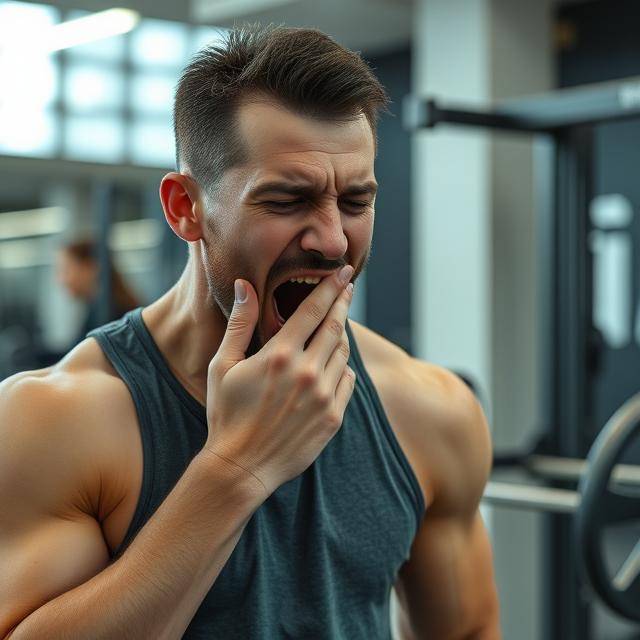
Why Do I Yawn When I Exercise? The Surprising Link Between Movement and Fatigue

Why Do I Yawn When I Exercise? The Surprising Link Between Movement and Fatigue
Yawning during exercise can feel confusing. You're moving your body, getting your heart rate up, maybe even sweating—and suddenly, you're yawning. It doesn’t seem to make sense. But yawning during exercise is more common than people think. It’s not always about being tired. In fact, yawning while exercising can actually be your body trying to help you perform better.
What Does It Really Mean When You Yawn During Exercise?
So why does it happen? Yawning during exercise is often your brain's way of cooling down and getting more oxygen. It's a built-in reset button when your body senses mental or physical overload. If you’ve ever wondered why you’re yawning on a run, during a lift, or halfway through a workout class, this is probably why.
At FITSCRIPT, we see this all the time. People come to us frustrated, thinking they’re too tired or not fit enough. But once we help them understand the real reason behind yawning while exercising, it clicks. It’s not a sign of weakness—it’s a signal from your body.
Why Yawning Happens in the Middle of Movement
Here are a few of the top reasons for yawning during exercise:
- Your body needs more oxygen than you’re giving it
- You’re not breathing deeply or steadily enough
- Your brain is overheating and needs to cool down
- You’re under mental or physical stress
- You started exercising without a proper warm-up
Yawning while exercising doesn’t always mean something is wrong. It’s often just feedback from your system that something needs adjusting. That’s why we build breathing awareness and pacing right into our coaching at FITSCRIPT. When you train with us, you learn how to move smarter—not just harder—so your body and brain stay in sync.
If you’re yawning during workouts and can’t figure out why, you’re not alone. And you’re not doing anything wrong. You just need a better understanding of how your body works and how to respond when it talks to you. That’s what we help with. Get started with us if you're ready to train with more awareness and less confusion.
How Yawning Helps Regulate Brain Temperature and Oxygen
Your brain doesn’t like getting too hot or low on oxygen. That’s one of the key reasons yawning during exercise happens in the first place. When you move, your core temperature rises, and your brain starts to warm up too. Yawning is your body’s quick fix—it cools the brain and increases oxygen intake to keep your focus sharp and your muscles firing.
This is where yawning while exercising becomes helpful, not harmful. It’s your brain protecting itself from overheating, kind of like a built-in air conditioner. The cooler your brain stays, the better your performance. So if you’re yawning at the gym or on a run, it could mean your brain is trying to keep up with what your body is doing.
At FITSCRIPT, we train people to listen to those cues instead of ignoring them. Yawning isn’t something to hide. It’s a tool your body uses to manage stress, oxygen, and performance. When you know how to respond, you’ll get more out of every session.
How Yawning Supports Performance
Here’s how yawning helps while exercising:
- Boosts oxygen delivery to the brain
- Helps lower brain temperature
- Keeps your mental alertness steady
- Supports balance between exertion and recovery
- Signals the need to adjust breathing or pace
When you train with us at FITSCRIPT, we help you understand how these small things can make a big difference. Yawning during exercise isn’t failure—it’s feedback. And when you use that feedback to guide your training, you move smarter and feel better.
If yawning while exercising keeps showing up, it might be time to look at your routine, warm-up, and breathing habits. Get started with us to train in a way that supports both your brain and your body, not just your muscles.
Research from the University at Albany has shown yawning helps cool the brain, which can improve alertness and performance during stress or heat.
The Role of Blood Flow and Fatigue During Physical Activity
Yawning during exercise doesn’t just come from heat or lack of oxygen. Fatigue also plays a role—especially if your blood flow isn’t keeping up with your movement. As you train, your body pushes more blood to your muscles and brain. But if your circulation is off or your body is tired, you might not be getting the supply you need fast enough. That’s when yawning while exercising kicks in.
This is your body’s way of saying, “I need more.” More oxygen, more focus, more balance. You might be pushing too hard too early. You might be skipping your warm-up. Or you might be starting your session already drained. All of that impacts blood flow and can lead to brain fatigue, even if your muscles still feel strong.
We work with people inside FITSCRIPT who experience this all the time. They feel strong physically but mentally checked out halfway through a workout. Once we help them fix their warm-up, pacing, and recovery, they stop yawning mid-set—and their performance improves across the board.
How Blood Flow and Fatigue Trigger Yawning
Here’s what’s going on when your body doesn’t keep up with your energy demands:
- Blood flow is redirected to muscles too fast
- The brain feels under-fueled and signals fatigue
- Incomplete warm-ups leave systems out of sync
- Poor hydration or nutrition reduces circulation
- Accumulated stress affects oxygen and alertness
Yawning while exercising is often your body’s early fatigue signal. It shows up before your form breaks down or your strength fades. That’s why it’s useful. It’s your body giving you a heads-up that you need to adjust.

At FITSCRIPT, we help you create a warm-up, breathing rhythm, and training pace that supports strong blood flow and steady mental energy. When your brain and body are working together, everything feels smoother. And you stop asking why you’re yawning—and start noticing how sharp you feel instead.
If your workouts leave you foggy, not focused, get started with us. We’ll show you how to train with energy and awareness so your body performs and your brain stays alert. That’s how real results happen.
Is Yawning a Sign of Overtraining or Under-Recovery?
Yawning during exercise can sometimes be your body asking for help. If you’re yawning more often during workouts, especially in the middle of intense sets or cardio, it might mean you're not recovering enough. Yawning while exercising isn’t always about boredom or laziness—it’s your brain signaling that something’s out of balance. It can be a real clue that your training load is too high or your recovery routine is too low.
Overtraining doesn’t always show up as sore muscles or injury. Sometimes, it shows up as constant yawning during exercise. Your body starts slowing down before you even realize it, and yawning becomes a signal that your brain is struggling to keep up.
At FITSCRIPT, we help people understand these signs early. We teach you how to train smart, recover better, and keep your workouts from draining you. When you work with us, you stop guessing and start responding to your body’s feedback in real time.
Signs That Yawning Might Mean Overtraining
Watch for these signs that yawning during exercise might be a sign of overtraining or poor recovery:
- You yawn at the beginning of workouts, not just the end
- You feel mentally foggy or sluggish while exercising
- You’re tired all day, even with decent sleep
- You don’t feel excited to train anymore
- You’re not making progress and your performance is dropping
Yawning while exercising is often one of the first signals that your system is overloaded. It’s your brain’s way of asking for more rest, more fuel, or a better balance between stress and recovery.
We help people fix this fast at FITSCRIPT. You don’t need to stop working out—you just need a plan that supports both effort and recovery. When your body has time to heal, your energy comes back, your yawns go down, and your performance goes up. Get started here if you’re ready to train in a way that keeps your brain and body in sync.
When Should You Be Concerned About Yawning Mid-Workout?
Yawning during exercise is usually harmless, but in some cases, it’s worth paying attention to. If you’re yawning every single time you work out, especially if it’s paired with other symptoms like dizziness or shortness of breath, it could be pointing to a bigger issue. Most of the time, yawning while exercising just means you need better oxygen flow or pacing—but sometimes it’s a sign your system is off balance.
Your body is smart. When you’re yawning during exercise more than usual, it’s trying to protect you. That’s why it’s so important to tune into what your body is saying instead of ignoring it. At FITSCRIPT, we teach people how to catch early warning signs and adjust before it turns into a full crash or burnout.
When Yawning During Exercise Might Be a Red Flag
If these symptoms show up alongside frequent yawning, take a closer look:
- Feeling lightheaded, even with hydration
- Shortness of breath that gets worse over time
- Chest tightness or pain during movement
- Regular mental fog or memory issues after training
- Needing long naps or feeling totally wiped out post-workout
Yawning while exercising by itself isn’t usually dangerous. But if it’s part of a bigger pattern of burnout or under-recovery, you need to address it. That’s why we customize every plan at FITSCRIPT. We don’t just build a workout—we build a system that helps your body thrive, stay alert, and recover properly.

If you’ve been brushing off constant yawns and wondering why your energy still crashes, it’s time to stop guessing. Get started with us and we’ll help you understand your patterns, fix your habits, and rebuild your energy the right way.
A study states that yawning during intense activity may signal neural fatigue and be linked to the body’s attempt to stabilize brain function under physical strain.
How to Stay Energized During Intense Exercise
If you want to stop yawning during exercise, staying energized is key. Most people think yawning while exercising means they need to push harder or drink more caffeine—but that usually backfires. Real energy during workouts comes from planning, pacing, and preparation. And when all three are dialed in, yawns don’t show up nearly as often.
You don’t have to be a pro athlete to train with energy. You just need the right habits in place. At FITSCRIPT, we help people learn how to support their body before, during, and after workouts. That’s how you stop feeling drained and start feeling like your workouts are building you up—not wearing you down.
Smart Ways to Stay Energized During Workouts
Here’s how to stop yawning during exercise and feel more alert while training:
- Eat a light, balanced pre-workout meal 60–90 minutes before
- Stay hydrated with water and electrolytes
- Warm up properly to get your body fully awake
- Don’t skip cooldowns—they help manage recovery
- Use proper breathing patterns during high effort
- Avoid training on poor sleep or when totally depleted
These simple changes can make a huge difference. We’ve seen people go from constant mid-workout yawns to full focus and stronger performance—just by shifting a few habits. That’s what we help with at FITSCRIPT. You don’t need to train harder. You need to train smarter.
Yawning during exercise isn’t always bad. It’s just a message. And when you learn how to listen and respond, your workouts get better, your energy returns, and your results start showing up. Get started with us and let us help you create a routine that energizes your body and clears your mind. That’s how you win—one smart session at a time.
Table Of Contents
Unlock your full potential through advanced training protocols
Table Of Contents
YOU MAY ALSO LIKE THESE BLOGS

24/7 Support: Staying Accountable Between Workouts
Get 24/7 support for your goals with fitness accountability for men. Stay consistent with round-the-clock health coaching and real-time progress tracking built for success.

Why Weekly Q&A’s Accelerate Your Health Journey
Find out how weekly health coaching Q&A sessions offer expert support for men’s wellness and provide ongoing fitness guidance that keeps you on track to your goals.

Longevity Training: Beyond Cardio & Weights
Go beyond the basics with longevity training for men. Use advanced men’s fitness techniques and wellness longevity protocols to improve strength, energy, and recovery.
.png)
.png)
.png)
.png)
frequently asked questions
Is it normal to start yawning during exercise even if I'm not tired?
Yes, and FITSCRIPT helps you understand how your body uses yawning while exercising as a way to regulate temperature and oxygen during effort.
What causes yawning while exercising?
It often signals your body trying to cool your brain or fix oxygen imbalances. FITSCRIPT uses breathing techniques and pacing tools to help manage this natural response.
Does yawning during workouts mean I'm not breathing properly?
It can. FITSCRIPT guides you through controlled breathing exercises that support steady oxygen intake and help reduce yawning during exercise.
Can hydration affect yawning during workouts?
Yes. Dehydration can reduce blood flow and make yawning more likely. FITSCRIPT helps you manage your hydration before, during, and after sessions to limit yawning while exercising.
Why do I yawn more during cardio than strength training?
Cardio pushes your oxygen demands higher. FITSCRIPT tailors your cardio sessions to avoid overexertion that leads to frequent yawning during exercise.
Can stretching before a workout reduce yawning?
Yes. FITSCRIPT includes warm-up and mobility routines that prep your nervous system and reduce the need for yawning while exercising.
Does yawning mean I'm about to hit my physical limit?
It might. FITSCRIPT tracks fatigue cues so you can recognize when yawning during exercise signals a need for rest or a pace change.
Is yawning a sign of boredom during my workouts?
Sometimes. FITSCRIPT mixes up your workouts to keep your mind engaged, helping reduce yawning while exercising due to mental fatigue.
Can better sleep help reduce yawning in the gym?
Absolutely. FITSCRIPT encourages strong sleep hygiene because low-quality sleep often leads to excessive yawning during exercise.
What can I do to prevent yawning while exercising?
FITSCRIPT builds in breathing, pacing, hydration, and recovery strategies that directly target the causes of yawning while exercising.
Should I stop working out if I start yawning a lot?
Not necessarily. It depends on your energy and breathing. Pause, hydrate, and reset before continuing.
Is yawning linked to anxiety during workouts?
For some people, yes. Nervous energy or overthinking form can lead to yawning. Deep breathing can help settle this.
Can overtraining make yawning happen more often?
Yes. If your body is already worn down, it uses yawning as a signal that recovery is needed.
Does temperature in the room affect yawning?
It can. Hot, stuffy environments often lead to more yawning as your body tries to cool the brain.
Will caffeine reduce yawning while exercising?
It might in the short term, but it's not a long-term solution. Proper breathing and pacing are more effective for managing this issue.
Can poor form reduce the calorie burn from a plank?
Definitely. Bad form reduces engagement. Focused posture gives you better muscle activation and calorie output.
.webp)


